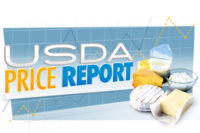Dairy processors and the foods they make have a pretty good reputation for safety and cleanliness. Aside from news articles about illness traced to consumption of raw milk, recalls of pasteurized fluid milk are not common. Drinking raw milk can be dangerous, especially when the product is mishandled by the purchaser.
Consumer concerns about food safety are real, and every food manufacturer needs to address these worries. The news last month about the adverse effects of pesticides in foods must have given food processors and retailers pause. In case you missed it, three new studies concluded that pesticides used in food production and around the house might affect the brains of babies whose mothers were exposed to the chemicals during pregnancy. The study revealed that the most exposed children showed a seven-point-lower IQ than children who were least exposed. Some researchers said the harmful effects of pesticides were similar to lead poisoning. Consumers are also worried about adverse effects of artificial food colorings, although the Food and Drug Administration (by an 8 to 6 ruling) said warning labels are not needed.
What can dairy processors do? Start with clean ingredients, for one thing. Processors know that consumers like milk from cows not given the bovine growth hormone rBST. So they state their use of rBST-free milk on milk, cheese and yogurt packaging. Last month the Organic Trade Association said sales of organic dairy products grew 9% from 2009 to 2010 (to $3.9 billion), and captured nearly 6% of the total U.S. market for dairy products. Sales of organic fruits and vegetables grew the most, 11.8%. Consumers will pay for organically produced foods. The share of market is small, but the point is that sales are growing.
Clean food starts with the raw material and carries through to production. But that’s hardly the end. Processors and distributors have to transport food safely to warehouses and retail locations, where it must be handled properly. The final link is the consumer who must be schooled on safe-handling practices in the home.
Good manufacturing practices
Dairy processors do operate clean plants. At the Wisconsin Cheese Industry Conference in La Crosse, Wis., a speaker said food safety is better than it ever has been, but inspectors are also getting better. The bar is rising and plant managers need to know best practices.“Food safety should not be a competitive advantage,” said one speaker, who encouraged plant managers to share their knowledge. Representatives from the Global Food Safety Initiative talked about why GFSI certification is important, not only from a food-safety perspective, but also from a business point of view. Retailers want assurances that food manufacturing facilities are up to snuff. Plants are audited constantly; one manager said he averages more than one inspection a month. If retailers and other stakeholders could get behind one certification standard, if would simplify matters for dairy processors. I heard that parties are working toward this.
The Food Safety Modernization Act now gives the Food and Drug Administration the power to issue a food recall. Previously, the FDA could only encourage manufacturers to recall unsafe foods. At the conference, I heard the story of a cheesemaker who (prior to enactment of the FSMA) refused to recall cheese contaminated with E.coli. Rather than cooperate with the FDA, the processor dug in its heels. The FDA responded by ordering a full-scale investigation of the plant, where it found dozens of unsafe practices. Conference speakers talked about the importance of developing a cooperative (not combative) relationship with the FDA. Use that relationship to educate FDA inspectors.
Pure, unadulterated milk
Personally, I like my yogurt plain. It’s full of naturally occurring protein, calcium and vitamins. I wonder why others opt for yogurt filled with sugar and fruit. Why would someone choose a perfectly healthy, natural food that’s junked up with additives? It makes me think of the Wisconsin Dells, a beautiful natural area that is overdeveloped with motels, outlet malls, go-cart tracks and waterparks. Some people can’t leave well enough alone. They cannot enjoy nature without a nearby Ye Olde Fudge Shoppe. Others cannot enjoy yogurt without fruit on the bottom and who-knows-what-else. Chacun à son gout.Besides clean ingredients and good manufacturing practices, a processor needs marketing. To sell cheese, you need taste and a story, says H. Hulst, an executive with Cono Kaasmakers (cheesemakers), a Netherlands-based dairy cooperative that sells its cheese in the United States under the Beemster brand.
Part of Cono’s story is its ethical treatment of dairy cows, says Hulst, who was a featured speaker at the Wisconsin cheese conference. The co-op pays a premium to farmers who graze their cows outdoors. (That scores points with the ethical-treatment-of-animals crowd.) Another part of the story is the sweetness of the grass the cows eat. Hulst said he believes the composition of the soil in the polders (reclaimed marshland) gives the grass a better taste, and hence the milk. The polder is a UNESCO World Heritage site. If my product was linked to such a site, I’d include that in my story. Wouldn’t you?
Clean ingredients. Clean facilities. Clean labels. This is your business. These are stories for you to tell.



